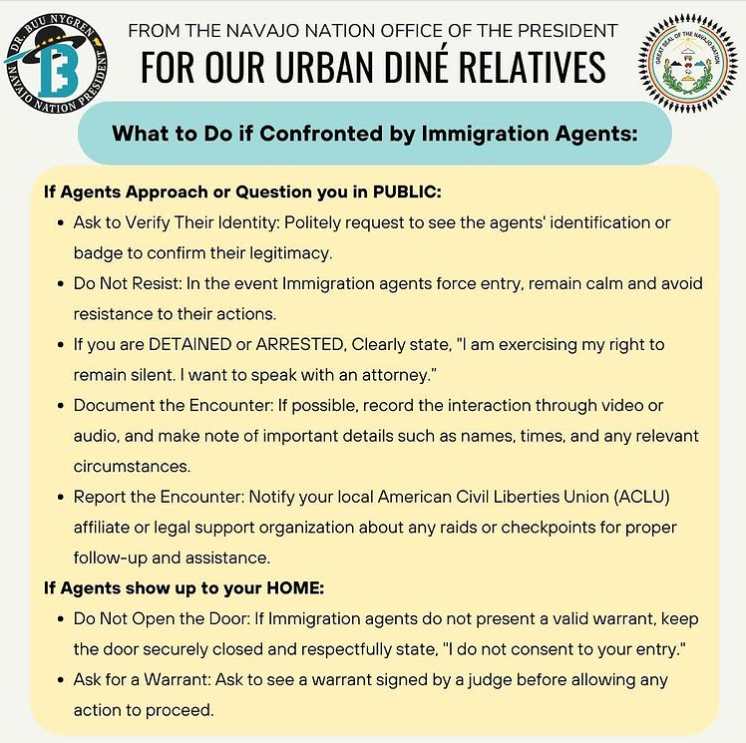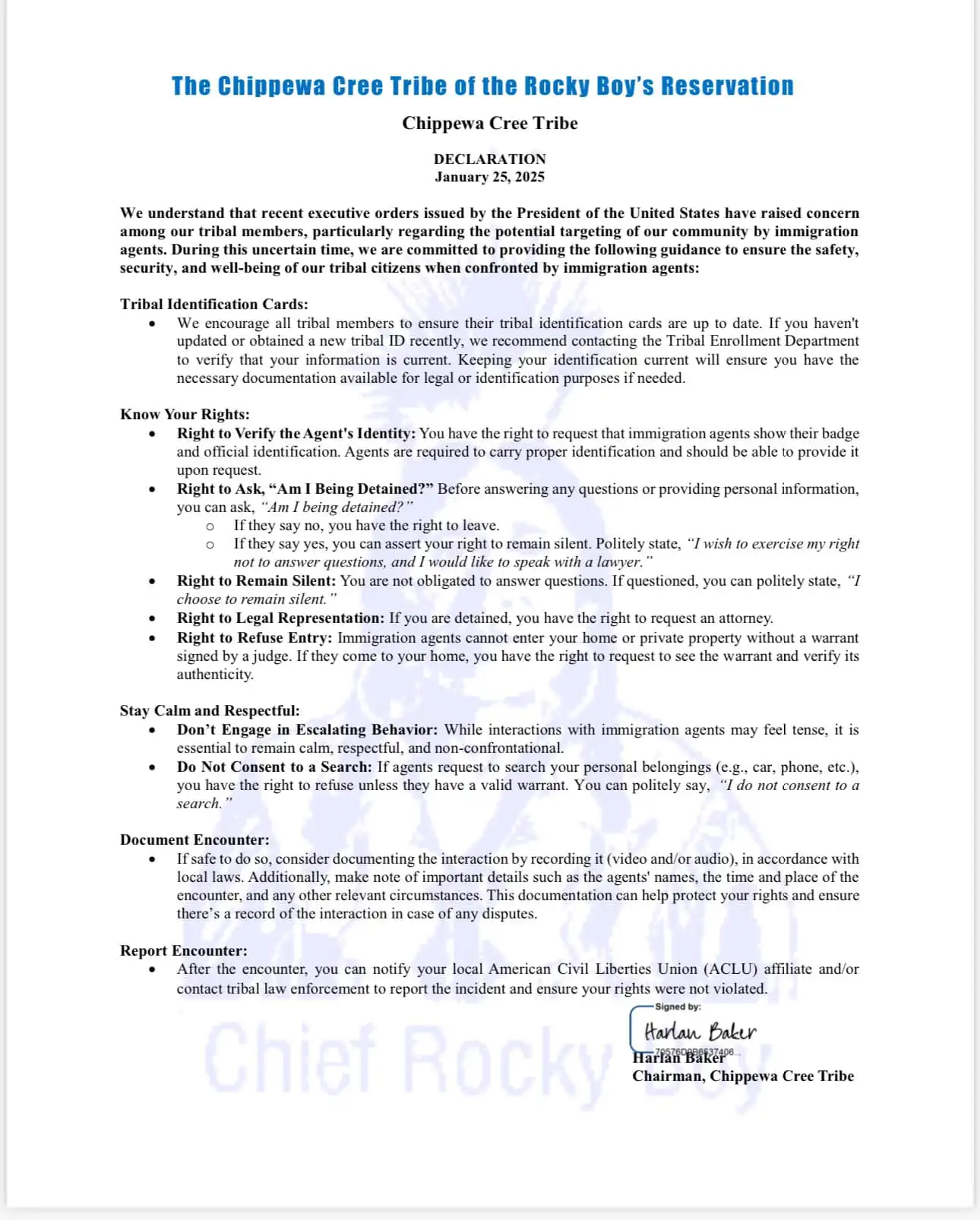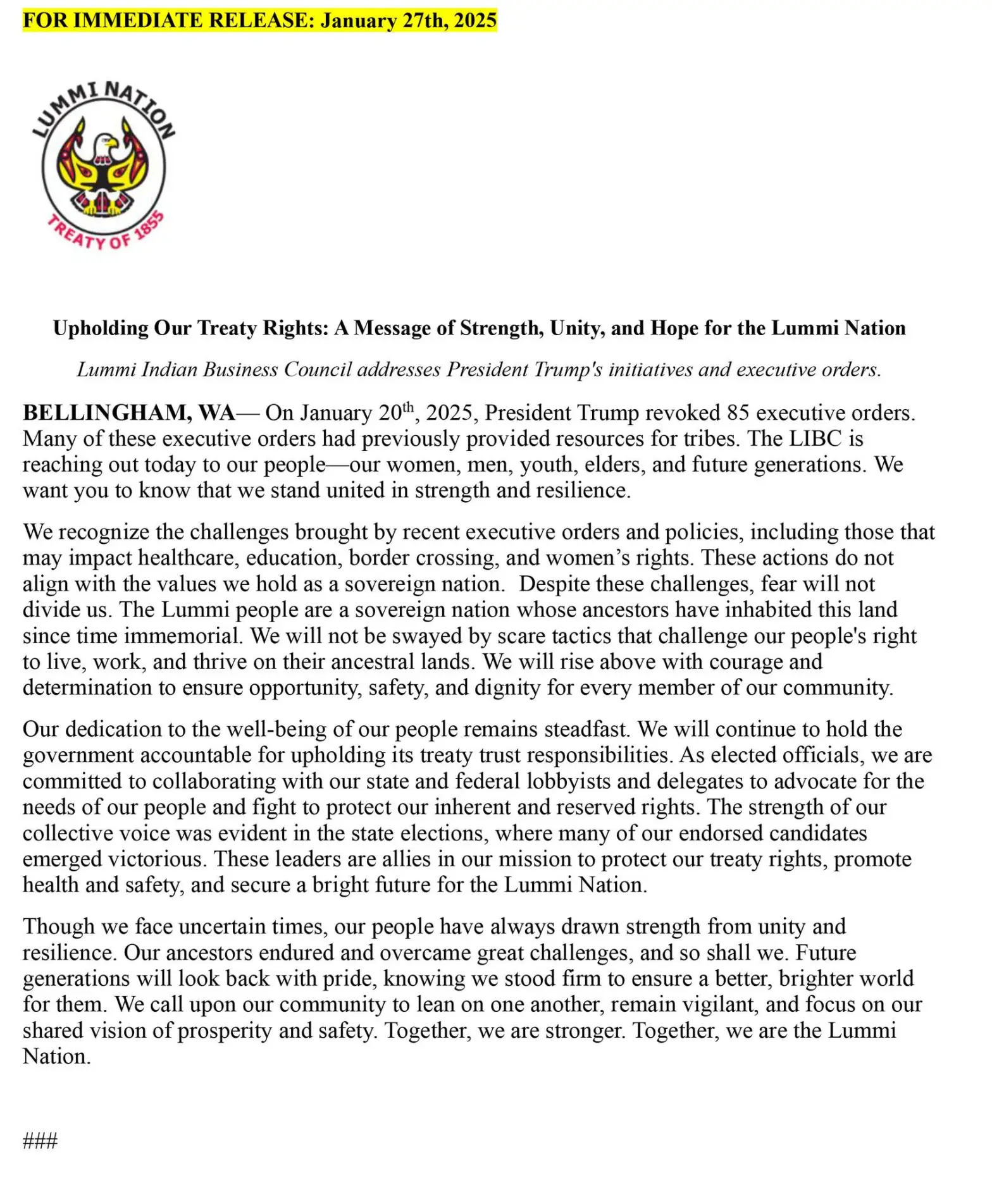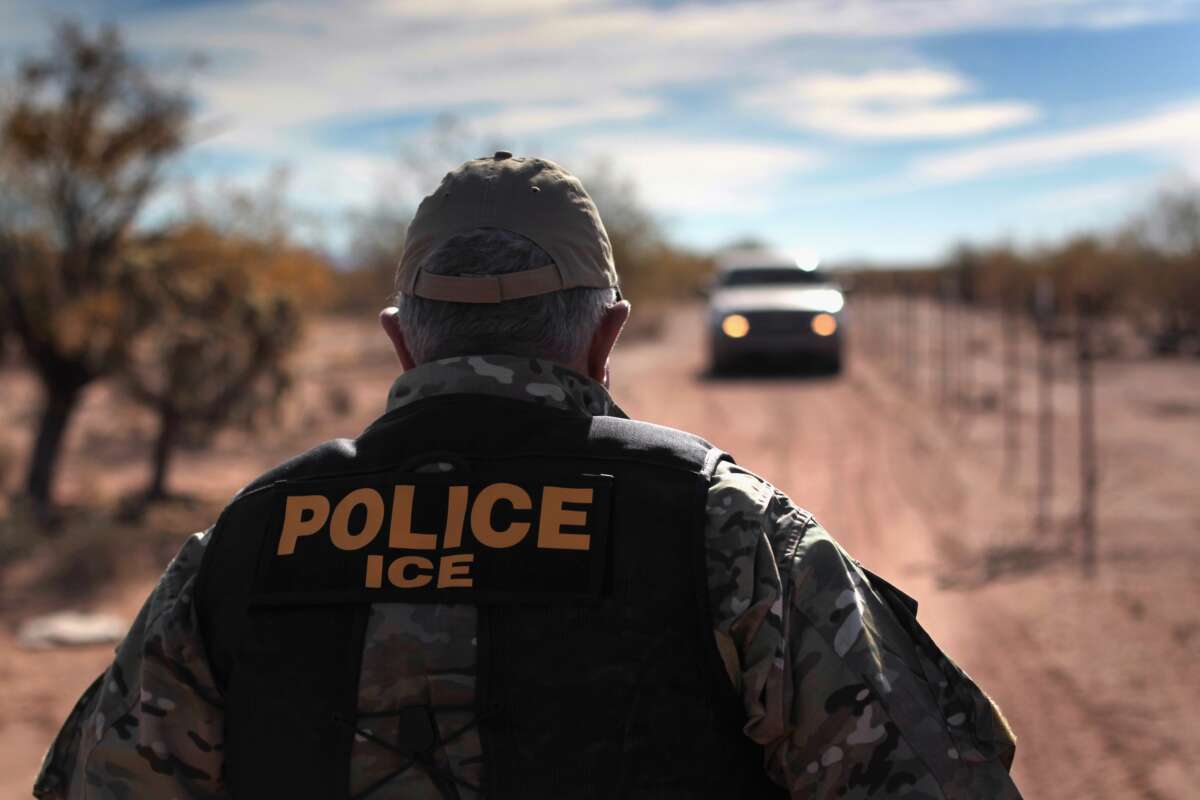Truthout is an indispensable resource for activists, movement leaders and workers everywhere. Please make this work possible with a quick donation.
Tribes across the U.S. are responding to reports of Indigenous people being racially profiled, stopped, questioned and mistakenly detained by federal agents targeting undocumented immigrants as part of the Trump administration’s sweeping immigrant crackdown.
Navajo Nation President Buu Nygren said in a Jan. 24 news release that his “office has received multiple reports from Navajo citizens that they have had negative, and sometimes traumatizing, experiences with federal agents targeting undocumented immigrants in the Southwest.”
“We now know that Navajo people and enrolled members of other tribes are being detained in Phoenix and other cities by ICE,” Navajo Nation Council Speaker Crystalyne Curley said during a Naabik’íyáti’ committee meeting on Jan. 23.

The Trump administration issued 10 executive orders and proclamations to change U.S. immigration law and policy on the president’s first day in office as part of what it calls “the largest mass deportation operation in American history of illegal criminals.”
Following rising reports of their citizens being harassed and detained by agents of U.S. Immigration and Customs Enforcement (ICE), Native nations and Native leaders from across Turtle Island have been working diligently to ensure their citizens’ safety.
While more Native nations have been working toward enhanced tribal identification cards, the vast majority of tribal enrollment identification cards aren’t enhanced — meaning machine readable — data-sharing cards that confirm identity and U.S. citizenship, which leaves Indigenous people vulnerable during encounters with ICE agents.
Several Native nations, including The Yankton Sioux Tribe and Rosebud Sioux Tribe, are temporarily waiving tribal ID card fees for enrolled citizens, while the Ho-Chunk Nation is reimbursing costs for passports and the Navajo Nation continues to release resources and guides on what to say if you are stopped and questioned by ICE.
Aaron Payment, Sault Ste. Marie Tribe of Chippewa Indians, former first vice president of the National Congress of American Indians, called for enhanced tribal IDs in an interview with ICT Executive Editor Jourdan Bennett-Begaye.
“I would encourage tribal citizens to ask their governments to issue enhanced IDs or some form of greater identification, because not everybody has their birth certificates handy, not everybody drives, not everybody has a state ID,” Payment said. “And, you know, we’re brown people, and depending on different parts of the country, you know, these raids are not happening just along the southern border.”
Payment explained that a regular tribal ID is not enough in these cases because it doesn’t have the data strip on the back with U.S. citizenship-verifying information.
“We should not have to prove our citizenship,” Payment continued. “We are the original people in this country, but we’re in a scary time right now, and I don’t want any American Indian to get lost in the system. [ICE] ‘lost’ children the last time they did this. They lost little brown children that will never be reunited with their parents. And that is horrible. It’s just like the boarding school experience that we experienced.”
Reports Across Native Country
Arizona State Sen. Theresa Hatathlie joined the Navajo Nation’s Jan. 23 Naabik’íyáti committee meeting virtually and shared that she received a call about a case involving a Navajo citizen who was detained for nine hours. Hatathlie represents Legislative District 6, which encompasses the Navajo Nation.
Hatathlie also told CNN about a report of a Navajo woman who was questioned by ICE at her work site in Scottsdale, Arizona, along with seven other Indigenous people. They were lined up behind white vans and questioned for two hours before being permitted to contact family members, who sent her a photo of her Certificate of Degree of Indian Blood (CDIB). She was then released, according to Hatathlie.
Curley, the Navajo Nation council speaker, also detailed reports the council had received through social media and calls to council delegates from families who said they were visited by ICE at their apartments and places of work.
In light of the ICE reports, the Naabik’íyáti committee discussed the importance of an enhanced CDIB identification card system that meets federal standards.
On Jan. 22, federal ICE agents questioned a Mescalero Apache citizen and asked for a passport, according to Mescalero Apache President Thora Walsh-Padilla. When the citizen provided their New Mexico driver’s license and tribal identification card, the agent moved on.
In response, the Mescalero Apache Tribe released a statement saying that leadership is actively working to ensure the rights of its citizens are protected. It also included tips on how to respond if confronted by ICE agents.
“We want to ensure that Mescalero Apache Tribal members can effectively communicate their rights and concerns in relation to federal agents, fostering resilience and solidarity among tribal members,” the statement says. “Share the faith – we will get through this together!!”
The nation also shared a video on Facebook with advice about how to respond if approached by ICE agents.
Other reports have surfaced on social media across the U.S. about Indigenous people getting stopped and at times detained by ICE agents.

Northwest Immigrants Rights Project, an organization that defends and advances the rights of immigrants through direct legal services, systemic advocacy and community education, hasn’t received any reports of Native people being detained in Washington State but is monitoring the situation, according to Raul R. Alvarez, the senior communications manager at NWIRP.
Washington Immigrant Solidarity Network’s Deportation Defense Hotline recently received reports that an “Alaskan Native community member [was] pulled over for expired tabs outside their place of work, harassed, and asked about their immigration status,” according to text messages received by WAISN’s hotline manager, Nedra Rivera. “The original officer waited until two other officers joined as backup before starting to question and harass them.”Northwest Immigrants Rights Project, an organization that defends and advances the rights of immigrants through direct legal services, systemic advocacy and community education, hasn’t received any reports of Native people being detained in Washington State but is monitoring the situation, according to Raul R. Alvarez, the senior communications manager at NWIRP.
Washington Immigrant Solidarity Network’s Deportation Defense Hotline recently received reports that an “Alaskan Native community member [was] pulled over for expired tabs outside their place of work, harassed, and asked about their immigration status,” according to text messages received by WAISN’s hotline manager, Nedra Rivera. “The original officer waited until two other officers joined as backup before starting to question and harass them.”
Rivera also received a message expressing concern about being racially profiled and pulled over by ICE from a Native community member who reported an ICE sighting.
In Washington, the Confederated Tribes of the Colville Reservation, Muckleshoot Indian Tribe and Puyallup Tribe, along with others around the country, are closely monitoring the executive orders and other actions from the Trump administration for impacts on their citizens and proactively working to protect their citizens’ treaty rights, sovereignty and other interests long fought to uphold.
Last month, Washington state also created a new Family Separation Rapid Response Team, aimed at reducing harms caused by the Trump administration’s immigration enforcement policies, which, if implemented, state officials said will destabilize families and harm children who are separated from their deported or detained parents or primary caregivers.
While members of the rapid response team have not yet been selected, Brionna Aho, the communications director for Gov. Bob Ferguson, said there will be Native representation.
Despite confirmed reports, some Native nations aren’t convinced the issue is a major concern.
An announcement Jan. 25 by president of the Rosebud Sioux Tribe, Kathleen Wooden Knife, called the executive orders unlawful and unconstitutional and authorized funds for CDIB identification cards.
The Rosebud Sioux Tribal Council released a statement days later on Jan. 28 acknowledging their citizens’ concerns about “rumored, but unverified, Immigration and Customs Enforcement (ICE) raids in which Native Americans have been detained alongside suspected illegal immigrants.” The release emphasized that Rosebud Sioux Tribe citizens are also U.S. citizens.
While the council believes that there is “absolutely no reason to think that ICE is targeting or profiling Native Americans,” councilors also say “it is possible, albeit very unlikely, that Tribal citizens in the presence of illegal immigrants that ICE is targeting might be questioned about their U.S. citizenship.”
The Rosebud Sioux Tribe is working with its enrollment department to order supplies and allocate funding to meet Wooden Knife’s request of providing CDIB cards, which the tribe calls an official government document, for free for its citizens. With a population of over 35,000 tribal citizens, funding for all of their citizens would cost over $800,000.
In an effort to curb concerns among its citizens, the Rosebud Sioux Tribal Council also said “ICE will have to contact the Council through our Law Enforcement for permission to enter our lands.”
The tribe will be also contacting the U.S. Department of Homeland Security to provide examples of its tribal IDs and CDIB verification documents, both of which are only given to citizens of the tribe, and will provide a contact number to the enrollment office to contact for verification of any member’s enrollment.
Tribal officials also advise that citizens provide state-issued identification like driver’s licenses, or tribal IDs or CDIBs, to ICE agents, but reiterated that birth certificates and U.S. passports are the only forms of verification of U.S. citizenship.
The Shonshone-Bannock Tribes in Idaho similarly said reports of arrests and detentions of Natives have been unconfirmed but encouraged citizens to carry state and tribal identifications cards and to report any “incidences of racial profiling or discrimination by police or federal authorities to the Fort Hall Police Department.”
In a brief statement on Jan. 27, The Crow Tribe said that even though “social media may be abuzz” with concern about ICE raids, none of its citizens should live in fear. The tribe also recommended carrying state and tribal identification.
In Montana, Fort Peck Assiniboine and Sioux Tribes Chairman Justin Gray Hawk Sr. said on Jan. 24 that Fort Peck citizens had reached out to express concern about a threat “to deport Native Americans along with Mexicans in the hope that nobody can tell the difference.” He also encouraged citizens to carry their enrollment identification card.
The president of the Ho-Chunk Nation, Jon Greendeer, released a video on Jan. 30 waiving the fee for Ho-Chunk tribal identification cards beginning on Feb. 3. Greendeer also announced the immediate processing of any tribal member who requests CDIB identification, as well as a “100% reimbursable payment program to enrolled members and their first line descendants (children thereof) who furnish proper receipt of passport costs.”
Greendeer reiterated that passports are the country’s most valid form of U.S. citizenship.
On Feb. 2, The Episcopal Diocese of South Dakota released a “Bishop’s Statement on Racial Profiling” after a priest in their diocese was racially profiled. The statement also reports that three citizens of the Sisseton-Wahpeton Oyate were taken into custody and detained by ICE without cause after showing ICE agents their tribal identification cards. They were eventually released. There is no mention of how long they were detained.
“Biblically, morally, and legally, we reject and condemn this fear-mongering behavior,” the statement reads. “We stand with tribal leaders in support of Native Americans who are being targeted; we stand with our Dinka siblings who worship at Holy Apostles in Sioux Falls; and we stand with all those whose skin color is reason enough in the eyes of some for them to be detained and questioned. Racial profiling is inherently racist and sinful and does not represent behavior worthy of God’s kingdom.”
A History of Profiling
A wide body of evidence shows that Native people are murdered by police more than other demographics, searched by police at far higher rates, charged with crimes at higher rates, and imprisoned at double the national average.
A 2011 report by Jacqueline Stevens, a political science professor at Northwestern University, revealed that since 2003 more than 20,000 U.S. citizens have been detained or deported by immigration authorities. Stevens’ work closed 256 cases of U.S. citizens who were to be deported between January 2011 and September 2014.
Because there is no database of U.S. citizens and many ways someone can apply for citizenship — such as through U.S. Citizenship and Immigration Services, by asserting citizenship in immigration court or by applying for a U.S. passport — and because most immigration courts do not provide an attorney for those who cannot afford one, U.S. citizens already targeted in the current system have been deported.
For Native people across the U.S. who are born in traditional settings — like in Navajo culture where some women choose to give birth in hogans, which are small, octagonal structures made of mud and logs, rather than western hospitals where Native maternal death rates are high — there are already barriers to obtaining state-recognized birth certificates. Profiled immigration raids increase their vulnerability.
Profiled deportation is documented throughout history. The Los Angeles Welfare Department took sick and elderly patients who they thought were of Mexican descent and dropped them off in Mexicali, Mexico in the 1930s, as part of raids during the Great Depression that resulted in the deportation of up to 1.8 million people to Mexico, according to research conducted by former California State Sen. Joseph Dunn. Dunn estimates around 60 percent of those people were actually American citizens, many of them born in the United States.
In another immigration raid named after a derogatory term for Mexican people, featuring the same racist stereotypes of Mexican immigrants as dirty, disease-bearing, irresponsible criminals that are echoed in immigration discussions today, an estimated 1.3 million people, many of whom were U.S. citizens, were deported.
Indigenous communities in border areas in particular have long felt the brunt of federal immigration actions, even though they lived there long before the border existed. Before the 1848 Treaty of Guadalupe Hidalgo, the areas that would later become the states of California, Nevada, Utah, New Mexico, and Texas, as well as parts of Arizona, Colorado, Oklahoma, Kansas, and Wyoming, were Mexico — and Indigenous people lived on all of that land, as well all other land that comprises the U.S. today.
Today, there are at least 30 Indigenous communities straddling the international boundary that now divides Mexico and the U.S. Targeting by immigration officials is nothing new to these nations that straddle the border.
“We have tribal members that still have their rights violated, if not daily, and there is no way to hold them accountable to that,” April Ignacio, co-founder of Indivisible Tohono, who grew up and lives on the Tohono O’odham Nation and whose tribal lands are on both sides of the Arizona-Mexico border, told Oregon Capitol Chronicle.
“I don’t think any of us Natives are naive in knowing how state and federal legislation and laws impact our lives,” Ignacio said. “But what was normalized for us down south is now being publicly acknowledged and publicized by the media.”
During the first Trump administration, provisions of the Real ID Act expedited construction of a border wall along the U.S. side of the international line, which destroyed Monument Hill, home to the remains of those who fought in historic battles between O’odham and Indé (Apache) warriors.
Amid the reports of ICE agents targeting Indigenous people, Ignacio stressed the importance of knowing your rights. Many Native nations across the country have begun sharing information about these rights, namely the right to verify the ICE agent’s identity; the right to ask if you are being detained and, if not, the right to leave; the right, if detained, to remain silent; the right to an attorney; and the right to refuse entry. Immigrant agents do not have the right to enter homes without a warrant signed by a judge.
Community Support and Resilience
Native nations are also reminding their citizens to find strength and resilience in the histories their communities have already overcome and share the importance of coming together to continue that legacy.
On Jan. 23, Jarred-Michael Erickson, chairman of The Confederated Tribes of the Colville Reservation, issued an open letter encouraging Colville Tribal citizens not to move forward in fear.
“The strength of Indigenous people has always persevered and we will continue to endure,” Erickson wrote. “Our heritage, our connection to the land and our shared history have carried us through countless challenges and will continue to do so.”
The Fort Hall Business Council, the governing body of the Shoshone-Bannock Tribes, issued a statement on Jan. 24 acknowledging citizens’ concerns and advocating for unity.
“During times of uncertainty, our people continue to endure. The FHBC will remain focused and proactive in protecting the health, safety, and well-being of our people, lands, waterways and wildlife. We must be united and stand in solidarity together through this time.”
Muckleshoot Chairman Jaison Elkins released a statement reaffirming that the tribe will come together and continue to “fight” for treaty rights and tribal sovereignty no matter “who is in the office in Washington D.C.”
“Whatever comes next, we walk this road together as Muckleshoot Tribal members and our strength and resilience come from our continuity of community and our culture,” Elkins wrote.
“Now is the time to come together as a Tribe and support each other and look out for one another as has been our way for generations,” Elkins continued. “There will be opportunities and obstacles in the upcoming months, as there always are, but together we can handle anything.”

Lummi Indian Business Council issued a statement on Jan. 27 of “strength, unity, and hope.”
“Though we face uncertain times, our people have always drawn strength from unity and resilience,” the statement reads. “Our ancestors endured and overcame great challenges, and so shall we. Future generations will look back with pride, knowing we stood firm to ensure a better, brighter world for them. We call upon our community to lean on one another, remain vigilant, and focus on our shared vision of prosperity and safety. Together we are stronger. Together we are Lummi Nation.”
Underscore + ICT reached out to the U.S. Immigration and Customs Enforcement (ICE) for comment and confirmations of cases. ICE has not responded.
Jarrette Werk contributed to this article.
This article first appeared on Underscore Native News and is republished here under a Creative Commons license.![]()
A terrifying moment. We appeal for your support.
In the last weeks, we have witnessed an authoritarian assault on communities in Minnesota and across the nation.
The need for truthful, grassroots reporting is urgent at this cataclysmic historical moment. Yet, Trump-aligned billionaires and other allies have taken over many legacy media outlets — the culmination of a decades-long campaign to place control of the narrative into the hands of the political right.
We refuse to let Trump’s blatant propaganda machine go unchecked. Untethered to corporate ownership or advertisers, Truthout remains fearless in our reporting and our determination to use journalism as a tool for justice.
But we need your help just to fund our basic expenses. Over 80 percent of Truthout’s funding comes from small individual donations from our community of readers, and over a third of our total budget is supported by recurring monthly donors.
Truthout has launched a fundraiser to add 310 new monthly donors in the next 4 days. Whether you can make a small monthly donation or a larger one-time gift, Truthout only works with your support.
